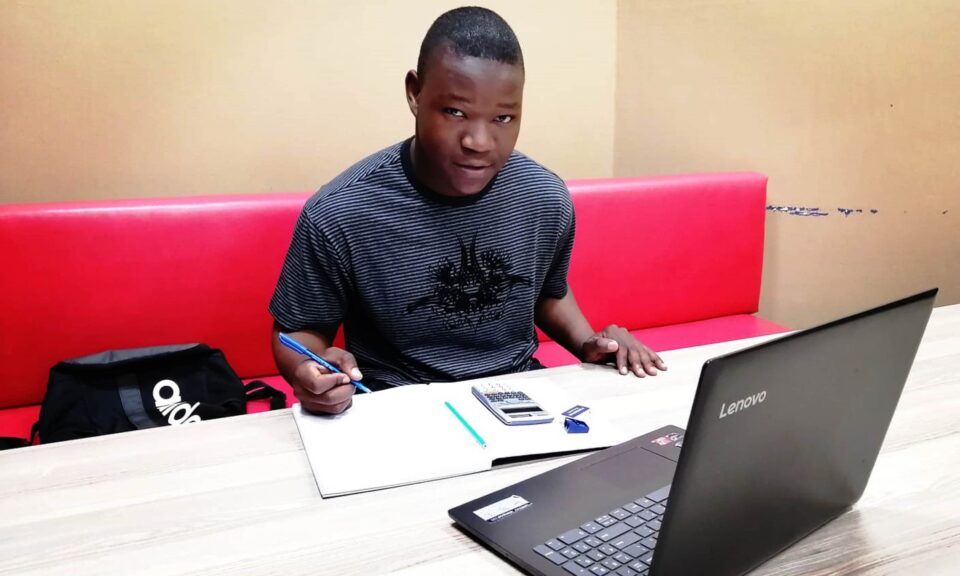Since the inception of the Globeleq Scholarship Fund, twenty-nine engineering students have benefited from support, funded by Droogfontein Solar Power, in the Northern Cape. Launched to help develop young engineering students for the nascent renewable energy industry and actively support the transformation of the industry, the fund is assisting engineering students like David Mpofu (22), from Kimberley.
David is in fact one of two engineers from the Northern Cape, studying with the help of this fund. Having lost his parents in 2016, he says the bursary has been a great help as it takes care of his study fees and helps him to believe in his future career dreams.
“I chose to study Engineering because I loved the subject at school – I really enjoyed the electricity part. So an Engineering Degree felt like the natural thing to do, as it is my passion. I really believe in what I am doing and I’d like to help change the world one day, even if only in a small way, with the skills I have learnt,” said David Mpofu, who is currently in his second year of study towards a Bachelor of Engineering Technology Degree, through the Central University of Technology in Bloemfontein.
As with most students current studying amidst the CV-19 restrictions, which is isolating, he has found it tough and has had to learn to handle the shift to online studying. He explained, “Studies wise, it was a serious transformation. You don’t study in the same way when things are online, and we also write exams online, which takes some getting used to.”
The GSF, which is creating a skills pipeline within the industry also helps to support and contribute to the long-term sustainability of the communities, such as those in the Droogfontein Solar Power’s 50km catchment area, and the country as a whole.
This focus stream is being offered nationally through institutions offering mechatronic or electrical engineering, namely, University of Johannesburg, Nelson Mandela Metropolitan University, Walter Sisulu University, Cape Peninsula University of Technology, Central University of Technology, Durban University of Technology, Mangosuthu University of Technology, Tshwane University of Technology, Vaal University of Technology.
“We developed this programme to help meet the demand within the industry for qualified engineers, to not only create a skills pipeline for our organisation, but also to help meet the growing demand for qualified black engineers and thereby supporting our country as a whole,” explained Hlengiwe Radebe, Economic Development Director for Globeleq South Africa Management Services (GSAMS).
Since 2016, the GSF recipients have been 100% black youth and over 55% female for the last two years, setting an ambitious target not only for the renewable energy industry but for other sectors who are striving to support the transformation of South Africa.The GSF programme believes that it utilises a less conventional and holistic approach to funding, by typically not only focusing on academic achievement, but rather on financial need, location of the students and gender to demonstrate its commitment to increase the cache of women engineers in the country and to the sector.
“Over the years the GSF has grown and expanded, however, it has consistently provided young people with exposure to the renewable energy industry, as well as offering opportunities through an internship programme for beneficiaries to gain the necessary work experience. Specifically, the opportunity for national diploma students to complete their required in-service training and thereby fill the technical skills gap within the renewable energy industry,” added Radebe.
In addition to engineering students, the GSF also provides extends financial support to the study fields of education, agriculture and nursing degrees and certificates for Western, Eastern and Northern Cape students, within beneficiary communities of the various renewable power plants, within the Globeleq South Africa portfolio.
The Engineering stream, which aims to meet anticipated renewable industry technical skill demand, enables aspirant engineers from around the country to acquire the qualifications and skills demanded by this sector, particularly BTech and ND electrical engineering and mechatronics, an inter-disciplinary field, combining traditional electrical, electronic, mechanical, control and computer engineering skills, as well as the traditional pure electrical engineering field.

